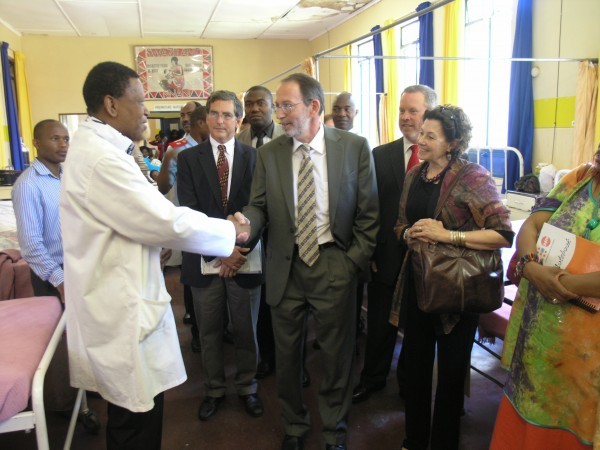
New Regional Partnership will bolster health systems to prevent Mother-to-Child HIV Transmission in Southern and Eastern Africa, the epicenter of the AIDS epidemic - Swaziland first country to participate
For Immediate Release
Manzini, Swaziland – In a response to the high rate of AIDS deaths and pediatric HIV in Southern and Eastern Africa, the United States Government through the United States Agency for International Development (USAID) andmothers2mothers (m2m) launched a five-year regional partnership today at an event in Manzini, Swaziland. The partnership, which is the first of its kind in the region, is part of USAID’s Southern Africa Regional HIV/AIDS Program (RHAP) and is designed to strengthen country-led programs to prevent mother-to-child transmission of HIV (PMTCT) and eliminate pediatric AIDS in Southern and Eastern Africa, the region hit hardest by the HIV/AIDS epidemic.
Swaziland will be the first country under the new partnership to receive USAID funding to implement m2m’s “Mentor Mothers Reducing Infections through Support and Education (RISE)” Project.
U.S. Ambassador to the Kingdom of Swaziland, Makila James, reports, “Over the past decade, the U.S. Government has made a substantial commitment toward eliminating mother-to-child transmission of HIV and improving the health of women, newborns and children.” She said, “USAID’s partnership with mothers2mothers will help advance these goals by strengthening the capacity of health workers, communities and governments to deliver vital maternal child health services.” Funding comes from the U.S. President’s Emergency Plan for AIDS Relief (PEPFAR).
While efforts to improve women’s access to PMTCT programs in Southern and Eastern Africa are beginning to show some success, many countries in the region still struggle with dangerously high rates of mother-to-child transmission of HIV. Most of the approximately 330,000 children newly infected with HIV in 2011 live in sub-Saharan Africa and most of them acquired HIV from their mothers during pregnancy, childbirth or breastfeeding.
“One of the biggest barriers to eliminating pediatric AIDS is the severe shortage of medical professionals in sub-Saharan Africa,” explains Ambassador James. Sub-Saharan Africa carries 25% of the global disease burden and yet has only 3% of the world’s health care professionals, which means that doctors and nurses frequently have only minutes to give a woman her HIV diagnosis and explain the treatment regimen.
“Other significant barriers include cultural and social stigmas associated with HIV and the disempowerment of women,” said Frank Beadle de Palomo, Chief Executive Officer of mothers2mothers. “The mothers2mothers’ Mentor Mother model overcomes these barriers by harnessing the capacity of communities to engage with a new tier of trained, professionalized lay health workers.”
mothers2mothers, an NGO (nongovernmental organization) based in Cape Town, South Africa, employs and trains “Mentor Mothers,” who are themselves mothers living with HIV, to work alongside doctors and nurses in under-resourced clinics. By providing peer education and psychosocial support to HIV-positive pregnant women and new mothers, the program has proven effective in helping women access medical interventions that significantly reduce the risk of mother-to-child transmission of HIV, supporting them to lead healthy lives. Because of their employment and expertise, Mentor Mothers gain financial security, become respected role models in their communities, and challenge stigma and discrimination around HIV.
m2m is currently collaborating with the governments of Kenya and South Africa to develop, implement and manage their own Mentor Mother programs. The development of country-run Mentor Mother programs aligns with the United Nation’s Global Plan towards the Elimination of New HIV Infections among Children by 2015 and Keeping their Mothers Alive which calls for national PMTCT programs and asserts that women living with HIV are to be at the center of efforts to eliminate mother-to-child transmission of HIV (eMTCT) efforts.
“USAID’s new partnership with mothers2mothers represents our continued efforts to strengthen national health systems and promote effective and sustainable PMTCT programs that will reduce the need for foreign aid over time,” says Jeff Borns, Mission Director of USAID/South Africa.
Under the RISE Project, m2m will work closely with host country governments, local organizations and other stakeholders to develop results-driven and sustainable Mentor Mother programs that respond to national HIV/AIDS and PMTCT strategic plans. The RISE Project will also enhance m2m’s core psychosocial support and education services by providing comprehensive health services to both HIV-positive and HIV-negative women and their families that include: tuberculosis pre-screening and education; cervical cancer education and referral; neonatal male circumcision education and referral; and gender-based violence support and referral.
In Swaziland, the first country to participate in the new partnership, the RISE Project will build on m2m’s Mentor Mother program that has operated in the country since 2008 at the invitation of the Ministry of Health. m2m currently provides peer education and psychosocial support services in 60 sites located across all four regions of the country, reaching an average of 1,950 HIV-positive women every month.
About USAID
Southern Africa is more severely affected by HIV/AIDS than any other region in the world. The burden of the epidemic is staggering. In at least six southern African countries, more than one in every five people is infected with HIV/AIDS; in Botswana and Swaziland nearly one out of three adults may be infected. Working through the President’s Emergency Plan for AIDS Relief (PEPFAR), USAID provides treatment, prevention, health system strengthening, and support for orphans and vulnerable children, and improved capacity of regional organizations.
About mothers2mothers
mothers2mothers (m2m) is eliminating transmission of HIV from mothers to babies and sustaining the health of women and children with its proven Mentor Mother model. Since its inception, m2m has reached approximately one million women in nine sub-Saharan countries, and has supported the establishment of Mentor Mother programs in two additional countries. Founded in Cape Town in 2001, m2m is a partner in the United Nations’ Global Plan towards the Elimination of New HIV Infections among Children by 2015 and Keeping their Mothers Alive. Learn more at m2m.org or follow mothers2mothers @m2mtweets.
Contact
Molly Sanchez Crowe, Public Affairs Officer, U.S. Embassy Swaziland
Phone: +268.2404.2059
Email: sanchezcrowemm@state.gov
Carolyn McEwen, Communications Manager, mothers2mothers
Phone: +1.323.969.0445
Email: carolyn@us.m2m.org







Comment
Make a general inquiry or suggest an improvement.